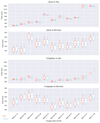Continuous Integration
For queries about this topic, contact Thomas Kluyver.
View the calendar of events relating to this topic.
Projects

Colonising Polynesia; Uncertain sailing craft route modelling
Thomas Dickson (Investigator), David Sear
Through developing a novel methodology of modelling sailing craft routing it is possible to investigate archaeological problems as well as applications to modern yacht racing and autonomous sailing technology. This research uses iridis to provide accurate and fast analysis of shortest path routes for sailing craft in order to provide insight and improve safety of operation.

Developing programming skills with Minecraft and Python
Hans Fangohr (Investigator), Alvaro Perez-Diaz
PythonTool is a Minecraft mod created for this project which allows interactive execution of Python scripts which interact with the game in real time. It intends to make teaching programming to children or non-expert users easier and more appealing.
Pushing the Envelope of Planetary Formation and Evolution Simulations
Peter Bartram
A full understanding of the formation and the early evolution of the Solar System and extrasolar planetary systems ranks among natural science's grand challenges, and at present, even the dominant processes responsible for generating the observed planetary architecture remain elusive.

Space Debris and Evolution of of Resilient Space Systems
Hugh Lewis (Investigator), Marian Daogaru
The aim of the project will be to characterise and quantify the possible evolution of space systems in response to future environmental change; in particular, with respect to changes in the space debris environment.
Space debris has been recognised by the international space-faring community as a significant threat to spacecraft operations in Earth orbit. Impacts on spacecraft can result in damage to critical systems, the loss of the mission, and the generation of fragment clouds which may go on to endanger other spacecraft. With the population of objects in near-Earth orbit ever-increasing, future space systems will need to develop greater resilience to the growing space debris threat. Resilience to this threat can be achieved in several ways, through adaptation, redundancy, protection, distribution and restoration, for example.
These resilience measures can be included within space systems design, which is a multi-objective optimisation process, such that the resulting spacecraft or architectural design is well-suited for operation in the space environment, whilst at the same time respecting mass, power, and cost constraints, amongst others. However, rapidly changing priorities in the space sector and changes in the debris population mean that optimal designs will need to evolve through time such that successive generations of spacecraft continue to be, or are better adapted to survive in the space environment. At the same time, better adapted spacecraft represent a possibly beneficial feedback into the space debris environment, meaning that future generations of spacecraft will also be indirectly affected by the designs of previous generations (and vice versa). Consequently, the multi-objective optimisation needs to be integrated with an appropriate space debris model.
The development of this integrated assessment and optimisation approach, and its application to identify future trends in space systems design, will form the basis of the project. Firstly, an appropriate methodology for identifying and representing the key design objectives, including concepts such as resilience, will be developed. Secondly, this methodology will be incorporated within a novel integrated assessment framework that will perform the multi-objective design optimisation through time.
Given the potential complexity of this task, arising from the large parameter space and the uncertainties in the future debris environment predictions, there will be a need for new and state-of-the-art computational modelling and optimisation approaches that enable solutions to be found in a reasonable time-frame. Such approaches could include evolutionary algorithms and particle swarm optimisation techniques. In addition, the project will also benefit from developments in space debris modelling coming from a parallel project.
People
 Hans Fangohr
Hans FangohrProfessor, Engineering Sciences (FEE)
 Hugh Lewis
Hugh LewisLecturer, Engineering Sciences (FEE)
 Peter Bartram
Peter BartramPostgraduate Research Student, University of Southampton
 Marian Daogaru
Marian DaogaruPostgraduate Research Student, Engineering Sciences (FEE)
 Samuel Diserens
Samuel DiserensPostgraduate Research Student, Engineering Sciences (FEE)
 Joseph Egan
Joseph EganPostgraduate Research Student, Mathematics (FSHS)
 Alvaro Perez-Diaz
Alvaro Perez-DiazPostgraduate Research Student, Engineering Sciences (FEE)
 Daniel Powell
Daniel PowellPostgraduate Research Student, Engineering Sciences (FEE)
 Marijan Beg
Marijan BegExternal Member, Imperial College London
 Thomas Dickson
Thomas DicksonNone, None
 David Sear
David SearNone, None